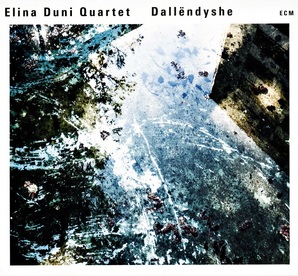
Dallëndyshe
ECM 2401
Elina Duni: Vocals
Colin Vallon: piano
Patrice Moret: double bass
Norbert Pfammatter: drums
“Love and exile carry the music of the whole world,” Elina Duni states. It is the basis of folk music and the music of her native Albania is replete with such themes. As wonderful as that folk music is, the challenge of transitioning those tunes and themes into Jazz is something that this quartet has managed with the skill of Odysseus between Scylla and Charibdis.
She has achieved that splendidly with the album “Dallëndyshe.” Though wrestling with themes of exile, there is no strangling grief or overwhelming darkness. Rather, Elina Duni and her chosen artists transform the shadows into images of contrast and better reveal the light.
“Fëllënza” opens the album and is a plaintive song translated as “The Partridge.” The intonation and inflections are sad while the instruments create a rather hypnotic atmosphere. Perhaps the Albanian lyrics carry little meaning to the outsider but her tone and diction carry the depths of the agony of separation and exile. Exile is the background theme to every song on the album.
On “Fëllënza,” Colin Vallon’s piano is wandering and lost on the right hand while the left hand creates a droning numbness. It is an imaginative portrayal of loss and languish. Patrice Moret (double bass) and Norbert Pfammatter (drums) contribute to the emotion in the same way. The despair is palpable.
“Sytë”(The Eyes) speaks of the tears of loneliness and the petition for help even from the moon, who is even farther away. The beautiful Balkan folk music and language are mesmerizing with the effect enhanced by Vallon’s percussive piano. Moret’s bass pierces the trance with occasional points of insight as the drums skitter and skate, almost uncertainly. From the first track to the second, a sense of growing misery deepens without respite.
The lover who has had to depart is beckoned in “Ylberin.” The lover left behind is bitter in her loneliness and declares “Damn them all, Ylber, the years you had to emigrate.” The separation is further lamented in “Unë Në Kodër, Ti Në Kodër” (Me on a Hill, You on a Hill) with the two lovers separated atop opposite hills but watching each other across the gulf that keeps them apart. This is one of the more lyrical and captivating of melodies on “Dallëndyshe.” Vallon creates a lush tapestry that is colorful and warmer than before. Duni herself is energetic and determined.
“Kur të Pashë” (When I Saw You) and “Delja Rude” (Sheared Sheep) moves from one season to another and the loss associated with Spring and Summer, with the rituals of those seasons now bereft of meaning in the face of such absence. “Dallëndyshe” is an expanding and developing chronicle of the exile most feared by every culture and individual.
Throughout the album, Duni bemoans the grief and bereavement of that exile but the instruments themselves, the music, begin to reveal an overcoming of that despair or, at least, a co-existence with it. In “Unë do të vete” (I Am Going to Go) and in “Taksirat” (The Mishap), the percussion creates dance moods to exemplify what Duni explains as a Balkan ideal, that “pain can be danced away.”
“Nene Moj” (O, Mother) opens with a fascinating, percussive one-note rhythm on the piano that is adopted by the bass and drums. The dance, obviously, continues. Pfammatter’s flat drumming and Moret’s strident bass provide the dance step of anguish of a girl married to one so far away from her home. “Bukuroshe” (Beautiful Girl), on the other hand, expresses the delight and desire of the man she has married. The vocals and piano mirror each other in one of the more intriguing associations of voice and piano, reflecting the conversation of the young woman and her groom. A captivating piece with the sense of sweet and joyous overcoming of grief.
That continues on “Ti Ri Ti Ti Klarinatë” (Ti Ri Ti Ti Clarinet). The feeling is lusty and delightful. The throbbing bass and drums propel the melody. The pulse of the lyrics is fanciful and rejoicing.
The album comes to a close with the title track “Dallëndyshe” (The Swallow). The memory of leaving home is thick with sorrow yet again. There is a profound expression of lost dreams. Though there may be reconciliation with exile, the pain remains unabated but, at least, understood.
The Elena Duni Quartet has created a saga of the desolation of exile. They have cast a light on the vistas and dramatis personae who must wrestle and ultimately succumb to the melancholy of that separation. It is a universal tale that is universally agonizing.
Visit Elina Duni's web site at:http://elinaduni.com/en
Purchase this CD here: http://www.discogs.com/Elina-Duni-Quartet-Dall%C3%ABndyshe/release/6907246
 RSS Feed
RSS Feed
